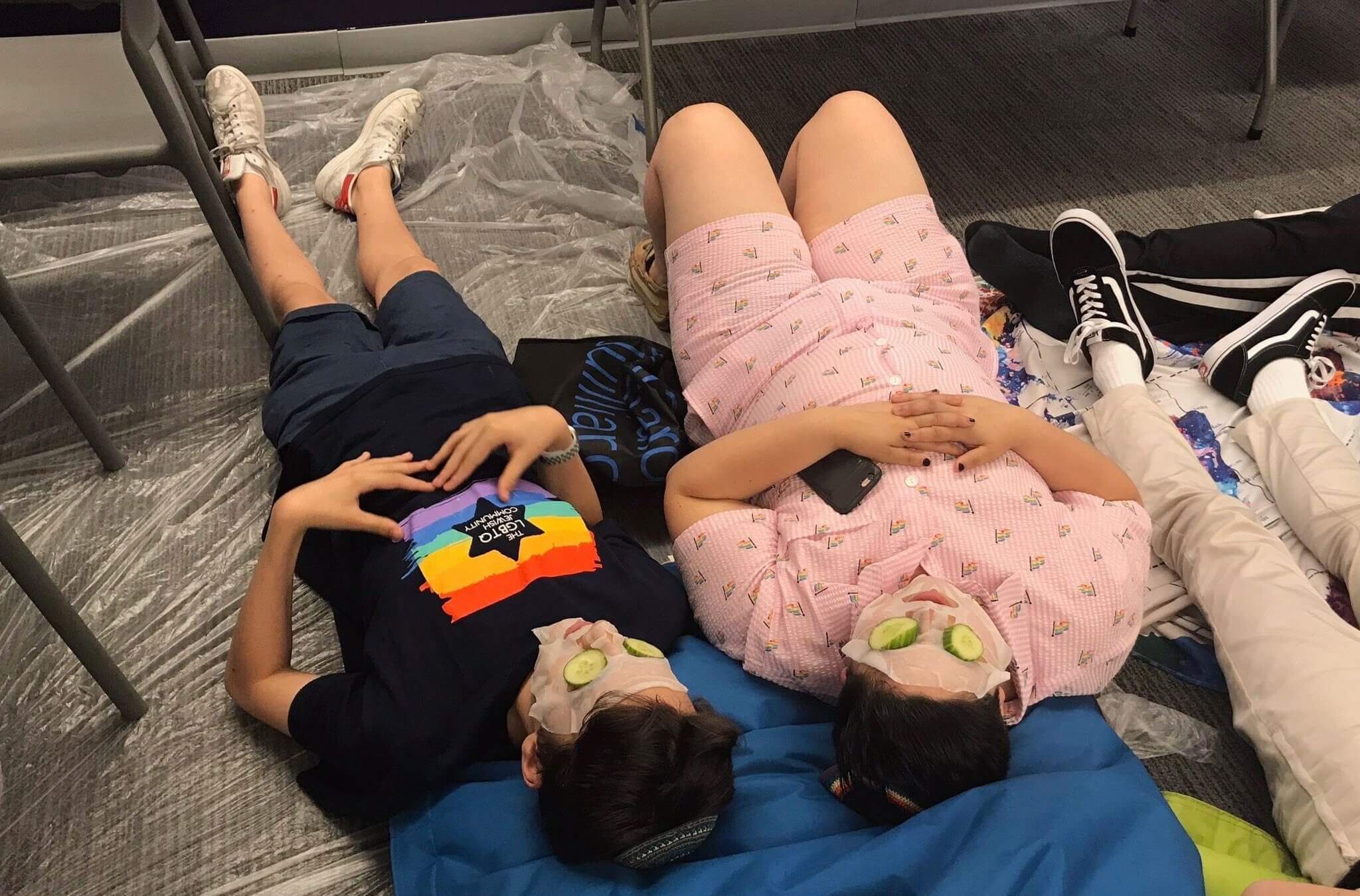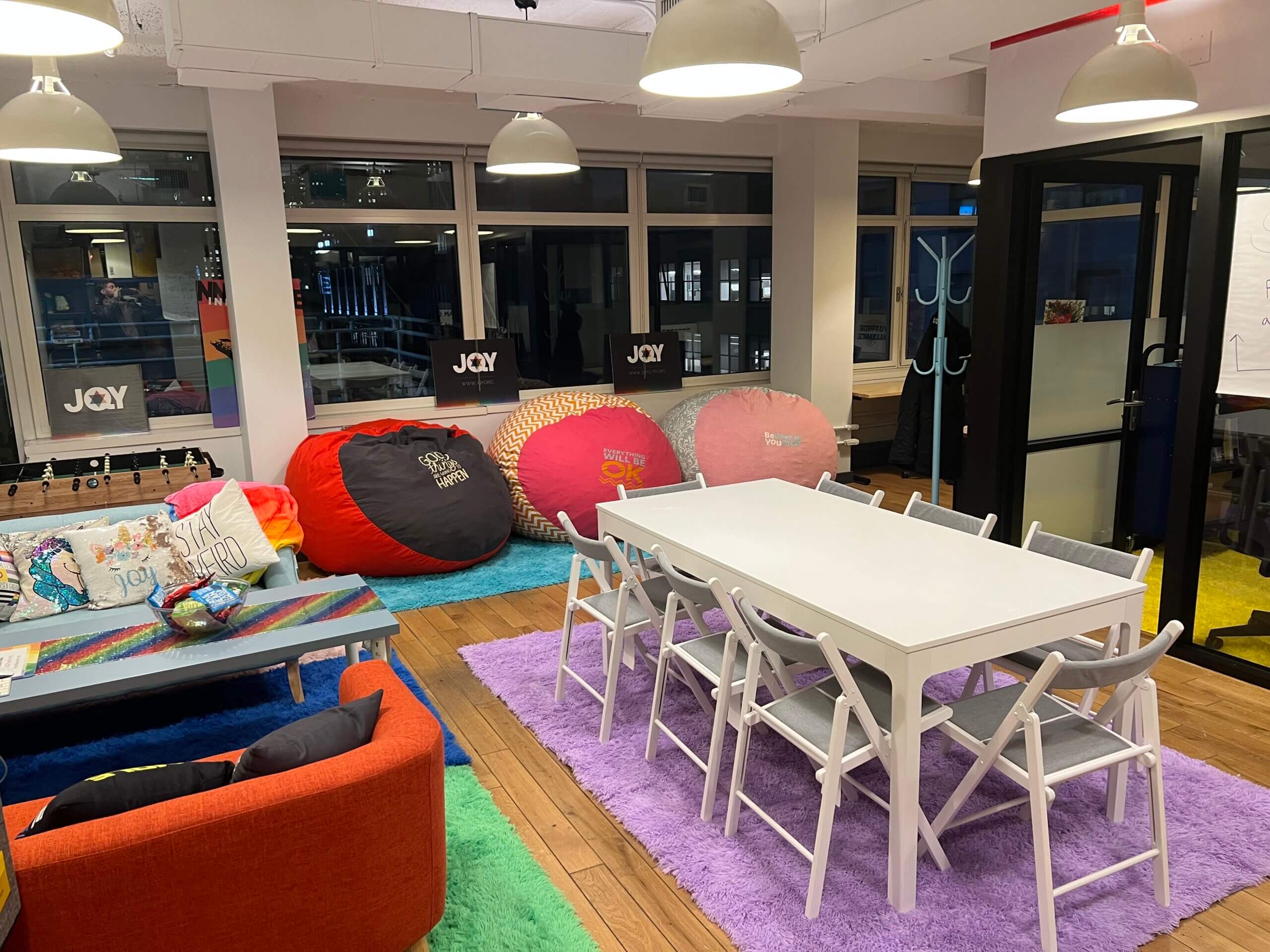Jewish Queer Youth is growing. For closeted Orthodox and Sephardic teens, that ‘means the world’
The organization will soon open centers in Chicago, Baltimore, Florida, Teaneck and Monsey.

Youth at a JQY drop-in center event. Courtesy of Jewish Queer Youth
Students come to Jewish Queer Youth secretively — through a Google search, a meme on social media, a pamphlet in their local pizzeria, a chat between two friends who suspect they might be the same in some way.
“I told my parents I was hanging out with a friend after school,” said N., a Bronx area native who asked to remain anonymous because some of their family members don’t know that they’re trans.
N.’s alibi was technically true. The friend was the person who’d told N. about JQY in their freshman year at a private Jewish high school, now six years ago. Together, the two attended one of JQY’s weekly events in Manhattan. There, they had access to social workers, kosher food, games and the sympathetic ears of mentors and peers who understood the weight of their secrets.
The drop-in center that N. and their friend visited is the hallmark of JQY’s programming. When the organization first formed unofficially in 2002, it was simply as a place in Manhattan for queer Jewish young adults to just be, without having to explain themselves to anyone. Since then, the organization has evolved to offer not only a sense of community, but also mental health services and a fresh link to Jewish identity for queer Jews aged 13 to 23 who come from Orthodox, Sephardic or Mizrahi communities, which can sometimes be unwelcoming to LGBTQ people.
“Most of our teens are not yet out of the closet,” said JQY’s clinical director, Mordechai Levovitz.
@jewishqueeryouth Who’s been there?#lgbt #lgbtq #gay #lesbian #bisexual #pansexual #demisexual #asexual #trans #nonbinary #jqy #queer #youth #pride #yid #selflove #support #identity #celebrateyourself ♬ original sound - Jewishqueeryouth
The only drop-in center currently open is the one in Manhattan, near Times Square. It’s a bright and colorful room equipped with board games, kosher snacks and bean bag chairs sporting inspirational messages. There’s also a library, a kitchen, and multiple private consultation rooms. When there are no events being held there, teens and parents can schedule visits, and the staff uses the space for team meetings and training.
There is also a drop-in center in Five Towns, Long Island, but it closed during the pandemic and has not yet reopened. JQY hopes to reopen it for the 2022-2023 school year.
But having just received a $1 million donation — the organization’s largest ever — from Toronto-based real estate developer Paul Austin and his partner, Dalip Girdhar, JQY plans to expand, and open physical drop-in centers in Teaneck, New Jersey; Monsey, New York; Chicago; Baltimore; and South Florida.
They already know something of the communities they’ll work with in each place. Young adults from each area, primarily from Orthodox communities, joined their virtual drop-in events during the pandemic. They also plan to expand their “hopeline” for people experiencing crises.
“It’s a big idea, and thank God we matched this big idea to this big donation,” Levovitz said.
*
When a teen or young adult attends a JQY drop-in session, whether in person or online, for the first time, their first stop is a private meeting with a social worker. In that conversation, the staff member asks about things like self-harm, access to food and housing, and the community the young adult comes from, with the goal of understanding their needs and assimilating them to the new environment.
Then, after the intake interview, the new JQY participant can meet people and participate in activities in the common area, like games, concerts or speaker events.

The pattern is more or less the same whether the drop-in session is in person or virtual. JQY started hosting virtual events during the pandemic, and while they’ve since resumed in-person events, they’re still committed to offering virtual programming even if the pandemic doesn’t require it. Each week, JQY sees an average of 25 teens at its in-person drop-in session and 15 at its virtual session.
But since drop-in is only one night a week, JQY provides other resources, too, including an app through which verified users can chat in community groups. JQY also holds phone drives to distribute cellphones to participants who otherwise might not have smartphones — often those from Haredi backgrounds — so that they can connect to the internet.
They even have a program through which they provide structure and support for students meeting unofficially at religious high schools where students aren’t officially allowed to form gay-straight alliances or similar clubs.
“If they need pizza for their meetings, we sponsor their pizza,” said JQY’s executive director, Rachael Fried.
But JQY knows that as useful as these resources can be, they only represent a first step toward helping young adults who feel like their gender identity or sexual orientation puts them at odds with their family and community.
According to a 2021 JQY report, over 70% of first-time JQY participants said they had experienced suicidal thoughts.
That’s why one of JQY’s most important offerings is their “hopeline,” a number that youth can call or text when they’re experiencing a crisis in order to speak to a social worker.
“It was mostly aligned so that you would call to speak to someone on the phone,” Fried explained, but since the pandemic began, “we’ve shifted much more toward a texting model because people were stuck at home and not able to talk out loud in the same way.”
In the past few months, the hopeline has gotten multiple texts and calls every week. Part of the recent donation JQY received will go toward expanding staffing for it.
And while the organization currently only serves young adults between the ages of 13 and 23, it plans to start a program for children under 13 in the coming years in response to a trend of youth disclosing their sexual and gender identities at younger ages.
*
B. is a 21-year-old from a Mizrahi community in the South who asked to remain anonymous because their parents don’t know that they are trans and pansexual.
“My parents are very set in their state of mind, and very traditional people,” B. said. “My older sister has come out to my parents already and I saw how they reacted to that. They still haven’t really accepted it, a few years later.”
When a friend of B.’s from summer camp told them about JQY, B., now attending college in Chicago, decided to join a virtual drop-in. They’ve been a regular attendee ever since.
“It’s made me feel less alone,” they said. And they’re particularly excited that Chicago is one of the cities to which JQY plans to expand.
“It’s really cool for me to see, especially because through JQY I’ve met a lot of queer Jewish people who live in Chicago, and a lot of them are younger people,” B. said. “I think especially for younger people who still live at home and are having difficulty with those experiences, it can be really isolating and lonely.”
“To have a place where you can go and look forward to attending, I think that means the world.”
But opening a drop-in center is not a simple process. It takes a while to begin integrating a JQY chapter into its local community.
In Teaneck, where the process is already underway, getting started has involved a lot of one-on-one and group conversations — important work, but time-consuming.
“We went in to get to speak to parents of LGBTQ teens, rabbis and educators of LGBTQ teens, tell them about JQY, talk to them about the concerns of the community, get to know the community a little more, figure out with them what’s the best location, and get to know some of the local leaders, therapists, and social workers who already work in the community who may partner with us,” Levovitz said. “We’re going to do that in each of our locations.”
JQY hopes to open the Teaneck center in spring 2023, the Monsey center in fall 2023 or spring 2024, and the centers in Chicago, Baltimore, and Florida within five years.
*
Years after they told their parents they were spending time with a friend when they were actually visiting JQY, N., now 21, is out to their parents and attending college in New York City.
“Without JQY, it would be a lot harder for me to reconcile my identities, being from a community that puts so much emphasis on Judaism and has that in opposition to my queer identity,” they said. “They’re both part of who I am, whether I want them to be or not.”
N.’s experience means that they have seen JQY — and their role within it — evolve over the years.
“We joke around in drop-in that I’m the veteran,” they said. “It’s really been exciting to be that mentor for others that people used to be for me.
“What’s really incredible is that even though JQY has branched out — it’s gained some staff members but it still only has a handful of full-time staff — it’s still just as devoted and just as caring to each individual.”
Yet even while the demand for resources like those provided by JQY has become more clear, N. says that many rabbis in their Orthodox community still don’t know how to deal with community members who are LGBTQ. They know — because they’ve tried discussing the matter with them personally.
“Rabbis have either brushed it off, probably because they were wary of attention, or had very negative reactions,” they said.
“The worst reaction was from a rabbi comparing being homosexual to being an alcoholic — as an urge.”
Still, though, N. thinks that speaking up about homosexuality is better than staying quiet, even if it leads to negative reactions. That way, they said, people can at least learn that there’s a word for how they feel, and that there are other people out there who feel the same way. Ultimately, they hope, that exposure — even if it’s initially negative — will help more people learn about and access helpful resources like JQY.
That’s important, N. said, because “once you grow up, no one’s going to stop you from being who you are; only you can stop you.
“Assuming you don’t get in your own way, it’s important to be able to figure out who you are.”
A message from our Publisher & CEO Rachel Fishman Feddersen

I hope you appreciated this article. Before you go, I’d like to ask you to please support the Forward’s award-winning, nonprofit journalism so that we can be prepared for whatever news 2025 brings.
At a time when other newsrooms are closing or cutting back, the Forward has removed its paywall and invested additional resources to report on the ground from Israel and around the U.S. on the impact of the war, rising antisemitism and polarized discourse.
Readers like you make it all possible. Support our work by becoming a Forward Member and connect with our journalism and your community.
— Rachel Fishman Feddersen, Publisher and CEO




























